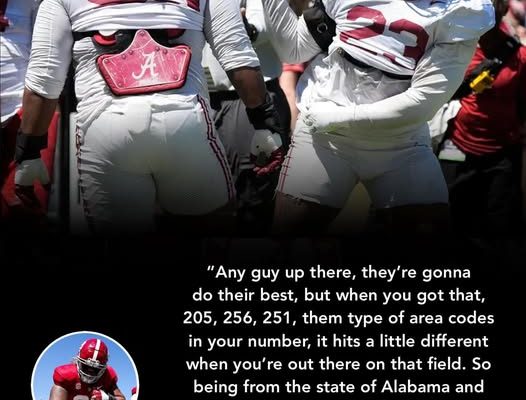There is something uniquely powerful about the bond between a player and the place they come from, and in college football, few programs tap into that connection as deeply as the Alabama Crimson Tide. For homegrown defenders—players born and raised within the state’s borders—putting on the crimson and white jersey is more than a career opportunity; it is a lifelong dream, a family legacy, and an unshakable badge of honor. Playing for Alabama football hits different for these athletes because they are not only competing for national titles, they are carrying the pride of an entire state and the weight of a tradition that stretches back over a century. For them, representing the Tide means defending the very soil they grew up on, and that creates a fire that outsiders simply cannot replicate.
From the moment they first picked up a football, many of these homegrown defenders knew the script they wanted to follow. Saturdays in Alabama are unlike anywhere else in America—families gather around televisions or pack into Bryant-Denny Stadium, communities shut down, and the game becomes a cultural event rather than just a sporting contest. Growing up in such an environment shapes a young player’s aspirations early on. For some, they sat in the stands as children and dreamed of being on the field. For others, the tradition was passed down through generations—grandfathers, fathers, and uncles who either played for or idolized the Crimson Tide. This deep-rooted connection means that when the opportunity finally comes to represent Alabama, it is not just another step in a football career—it is the fulfillment of a lifelong mission.
The recruiting process for Alabama is competitive on a national scale, but for in-state defenders, there is often a heightened sense of responsibility. They know they are not just representing themselves or their families, but also their hometowns, their high schools, and in some cases, the same neighborhoods where the Crimson Tide legends of the past once grew up. That pride often comes with pressure, but the best of them embrace it, using it as motivation to work harder, play smarter, and hit harder than anyone else on the field. Coaches often talk about the “edge” that in-state players bring, and much of that stems from the reality that these athletes have been immersed in the Alabama football culture since birth. They understand the program’s values, the expectations, and the absolute demand for excellence that comes with wearing the jersey.
For the coaching staff, homegrown defenders bring an added layer of trust. They arrive at the program already aware of the high standards, the championship mindset, and the way things are done in Tuscaloosa. Many have been fans long before they were recruits, so the transition into the locker room often feels less like joining a new team and more like coming home. That familiarity helps them integrate quickly, build relationships, and embrace the grueling demands of the Alabama system. The sense of belonging they feel isn’t something that has to be cultivated—it’s already in their blood.
Defenders from Alabama also tend to have a deep appreciation for the historical weight of the role they play. They are keenly aware of the lineage of greats who came before them—names like Cornelius Bennett, DeMeco Ryans, C.J. Mosley, and Minkah Fitzpatrick—even if some of those stars weren’t originally from Alabama, their legacies have become part of the fabric of the program. Homegrown players take pride in contributing to that lineage, and there is an unspoken understanding that their performances reflect not only on themselves, but on the state as a whole. When they make a big hit, force a turnover, or come up with a crucial stop, they know their communities are watching and celebrating. Every tackle is a chance to write another chapter in the story they grew up hearing.
One of the most noticeable differences with homegrown defenders is how they approach rivalry games. For an Alabama native, the Iron Bowl isn’t just another matchup—it is the ultimate test of loyalty and pride. Many of them have Auburn fans in their own families, making the rivalry deeply personal. The stakes feel higher, the intensity sharper, and the satisfaction of winning that game is unparalleled. Likewise, matchups against SEC opponents like LSU, Georgia, and Tennessee carry extra weight for those who have been watching these showdowns their entire lives. When you’ve grown up on the rivalries, the emotion pours out in your performance.
There is also a community aspect that cannot be overstated. Homegrown defenders often become hometown heroes before they even take their first snap in Tuscaloosa. Local newspapers and radio stations follow their high school careers closely, and when they sign with Alabama, it becomes a point of pride for the entire area. Younger athletes in the community look up to them as role models, proof that it’s possible to go from Friday night lights to the national stage. That sense of responsibility—knowing that kids are looking to them as examples—often pushes these players to not only perform on the field but to conduct themselves with integrity off it. They are ambassadors for their hometowns just as much as they are for Alabama football.
Another layer to the “hits different” mentality is the connection to the fans. Alabama supporters are passionate regardless of a player’s origin, but there is a special bond when the player comes from in-state. Fans feel a deeper connection because the player represents them in a literal sense. They might have attended the same high school, know the player’s family, or remember watching them in youth leagues. This familiarity creates an atmosphere where the cheers are louder, the encouragement more personal, and the pride more intense. In turn, players often feed off that energy, knowing they have the unwavering support of not just the student section, but of entire communities who have been cheering for them for years.
From a performance standpoint, this sense of belonging and responsibility often translates into a relentless work ethic. Homegrown defenders tend to embody the “process” that Nick Saban and his staff preach—not just because they’ve been told to, but because they’ve lived it. Many of them come from football cultures where discipline, toughness, and commitment are instilled from a young age. They’ve grown up understanding that success in football comes from preparation, resilience, and a willingness to sacrifice. When those qualities are paired with the natural pride of representing your home state, the result is a player who plays with a little more grit, a little more urgency, and a little more heart.
That’s not to say out-of-state players can’t fully embrace the Alabama way—they absolutely can, and many have gone on to become legends. But for the ones who grew up breathing Alabama football, there’s simply an extra spark. When they make a play in Bryant-Denny Stadium, it’s not just about the roar of the crowd—it’s about knowing that somewhere in that crowd are the people who watched them grow up, who supported them before the rest of the country knew their names. It’s about knowing that they are defending not only the end zone but the pride of the place they call home.
Even after their playing days are over, homegrown defenders often maintain a lifelong connection to the program and the state. Many stay in Alabama, start businesses, coach at local schools, or remain involved with the university. Their ties to the program run deeper than wins and losses—they see themselves as part of an ongoing story, one they helped write during their time in the uniform. For them, Alabama football isn’t just a chapter in their life, it’s part of their identity.
Ultimately, playing for Alabama football “hits different” for homegrown defenders because it blends the passion of fandom, the pride of heritage, and the competitiveness of elite athletics into a single, powerful experience. It’s about defending more than just a goal line—it’s about defending a legacy, a culture, and a state’s unwavering devotion to the game. The jersey may be the same for every player, but for those born and raised under the Alabama sun, the meaning stitched into that crimson fabric is deeply personal. They aren’t just playing for Alabama—they are playing for home, and in football, there is nothing more powerful than that.



